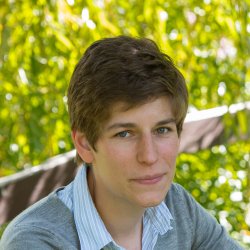Meet the academic: Dr Sarah Trinder
Dr Sarah Trinder, Teaching Fellow in Pharmacology, reveals what inspired her to get into biochemistry, what she loves about teaching the next generation of scientists and what she’s looking for in an undergraduate student.
From future careers to fascinating fields of research, Programme Leader, Dr Sarah Trinder joins undergraduate student, Jonny King for a catch up on the sofa. Find out more about studying biochemistry at Surrey.
Why did you become a biochemist?
I’d call myself a pharmacologist rather than a biochemist. Pharmacology is the study of drugs, so it’s an area of biochemistry, which is a broad and key area of science.
I was always been interested in the human body and I knew I didn’t want to be a medic, so the idea of working in research to develop new medicines was really exciting to me! So, I went to university to study pharmacology and got my integrated masters (MPharmacol).
During my degree, I spent a year on placement at Novartis, which back then had a base in Horsham. There, I worked in the labs, initially investigating novel treatments in chronic asthma. Then I was asked to help set up a new disease area for pulmonary hypertension, playing a key role in developing cellular and pre-clinical models.
Once you graduated, what did you do?
I went on to do a PhD, where I continued to research pulmonary hypertension. I was able to use all the skills I developed at Novartis while developing new ones. One of the drug combinations I researched has made it to clinical trials now – it’s really exciting to hear where your research goes!
After my PhD, I worked as a postdoctoral research fellow at the Centre for Rheumatology and Connective Tissue Diseases, Royal Free Hospital, UCL. There, I researched the development of pulmonary hypertension secondary to systemic sclerosis (scleroderma). I worked a lot more with patient samples and very closely with consultant rheumatologists.
How and why did you become an academic?
During my PhD, I suppose I was always an academic! I love research, but towards the end of my time at the Royal Free I got the opportunity to teach undergraduates, rather than just supervising them in the lab. This made me really re-think what I wanted from work. The experience was great fun and I really enjoyed helping students on their academic journeys.
What excites you most about your current role?
As the Programme Leader of the BSc (Hons) Biochemistry course, I love the daily interaction I have with students and creating new ways to help them understand concepts. It’s great when a student has a eureka moment and all the pieces start to fall into place, especially when I’ve played a role in getting them there – it gives me great satisfaction.
One of the best bits of my role is attending the graduation ceremonies. Teaching students all the way through their course is something very special and having the opportunity to celebrate their growth and achievement is always a real highlight.
What’s your area of expertise?
I’m interested in the remodelling processes that take place in the pulmonary vasculature and the lung in pulmonary hypertension. We still don’t completely understand what’s happening and we’re trying to work out how we can firstly halt it and, maybe in the future, reverse this. This could also give us more methods of tackling certain forms of cancer, too, as there are some areas of crossover.
Why should people study biochemistry?
Biochemistry is the study of life at the molecular level and it continues to lead to new advances in the understanding of the origin of life, development of pathological conditions and how organisms develop. It’s fundamental to the biosciences and it underpins all other specialisms within the field.
The understanding that you’ll develop and the skills you’ll acquire will give you a very strong base to go into other areas of bioscience should you choose. However, there are biochemists in pretty much all bioscience research labs and fields. Equally, should you decide science is not for you, the analytical and evaluative skills you’ll have developed will make you an attractive candidate in all manner of areas.
What are you looking for in a biochemistry student?
Someone with a bit of passion and an inquisitive mind – it’s great when students ask about the intricacies of systems or pathways!
Do you have any advice for prospective students?
You don’t need to know what you want to do at the end of your degree, that’s what your degree is for! You just need a genuine interest in the area. It’s also important to have fun, so bring your sense of humour, too!

